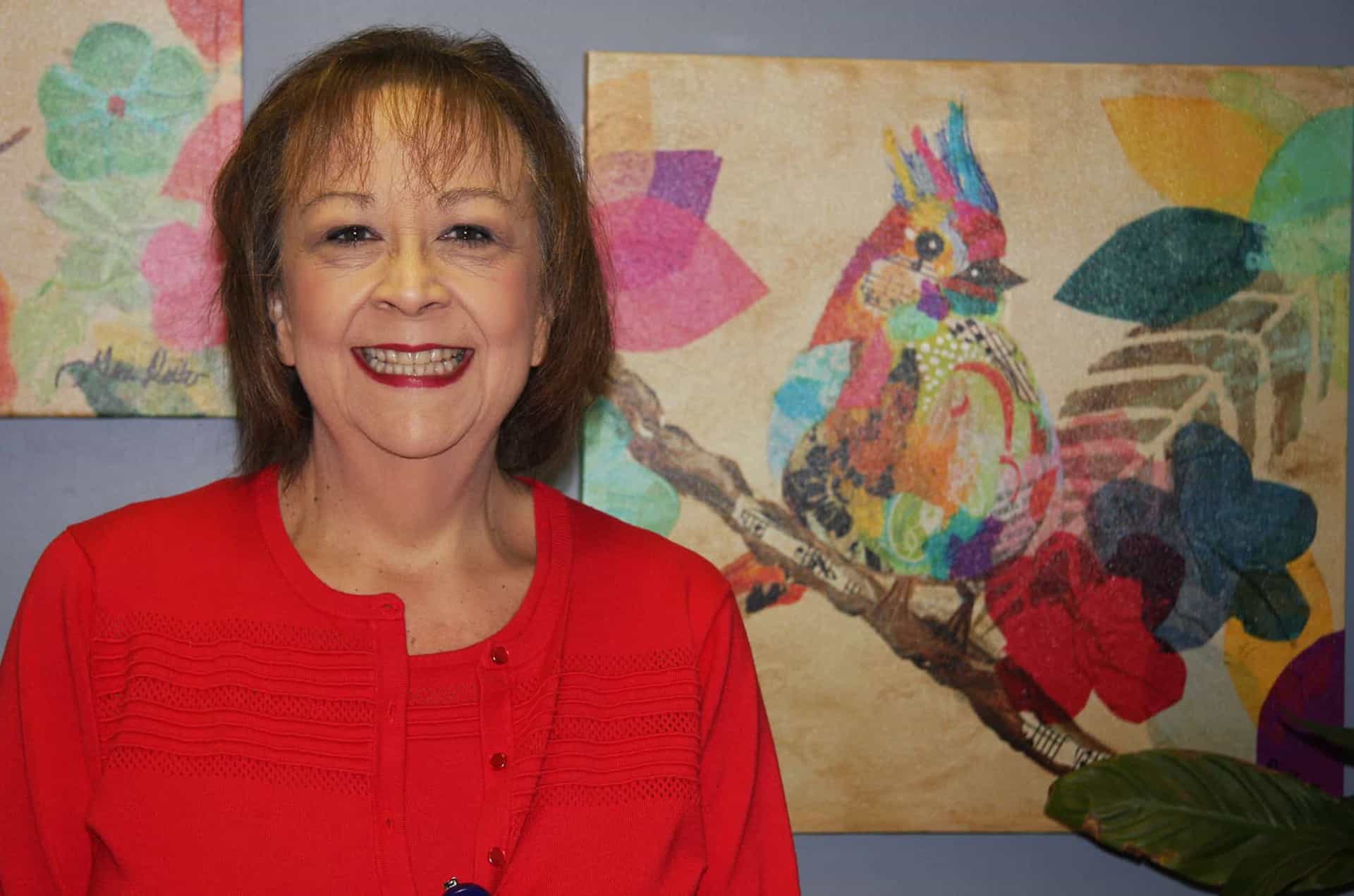Myeloma Patient Beth Jacks Grateful for Treatment Close to Home
| March 1, 2018 | Beth Jacks, 56, of Lonoke was excited to begin her new job at UAMS in May 2017 as executive assistant to Maurice Rigsby, vice chancellor for Institutional Relations. But when she accepted the offer, she had no idea she would soon need UAMS for more than a job.
Jacks was previously an assistant to the director of the Administrative Offices of the Courts for three years where she supported state courts on behalf of the Arkansas Supreme Court. When her boss retired last year, she decided to look for a new job. Her background with the court system, legislators and elected officials made her a good fit for her position at UAMS.
Several months earlier, in September 2016, she and her husband were camping when Jacks began having severe diarrhea. It was her only symptom but left her weak. She began losing weight and saw numerous physicians, trying to determine what was wrong.
“I was diagnosed with Irritable Bowel Syndrome (IBS) and told I was going to have to figure out what I could eat,” said Jacks.
But in September 2017, she noticed her legs were swollen and went to her primary care doctor who ran blood tests.
“I had a biopsy on my kidneys and a week later they told me I had a form of amyloidosis called Amyloid Light Chain,” Jacks said of the disease that usually affects people between the ages of 50 and 80 and is more common in males than in females.
Amyloidosis occurs when plasma cells in the bone marrow overproduce an abnormal protein called amyloid. It can build up in any tissue or organ, including the kidneys, heart, liver or spleen and can be fatal.
Jacks was referred to the UAMS Myeloma Institute where the myeloma specialists also treat amyloidosis. “My doctor knew this was the best place for me to be.”
However, her insurance provider through her husband’s employer didn’t include UAMS, and Jacks was going to have to go out of state for treatment. Fortunately, UAMS worked with the insurance company to get medical tests and her first treatments covered until she could switch in January 2018 to the UAMS employee insurance provider, which of course covered the Myeloma Institute.
She was grateful that while facing this serious disease requiring months of treatment that she didn’t also need to contend with driving hundreds of miles or having to take leave from her job.
Jacks prepared herself to begin to learn more about the rare disease.
“Here I was about to go through three days of tests that I had no idea of what it was and I had no idea of what to expect,” Jacks said.
“Fortunately, I got to see the rock star of the myeloma world – Dr. Morgan,” she said, referring to Gareth Morgan, director of the institute. “I knew he was the guy that I needed to see.”
In October, Jacks began a chemotherapy regimen of Velcade, Revlimid and dexamethasone on a cycle of three weeks on and one week off. During the weeks of her treatment, she is able to go on her Friday lunch hours in the UAMS Winthrop P. Rockefeller Cancer Institute, just a short walk from her office.
“I’m usually in and out in 30 to 45 minutes,” she said. “Working here gives me that advantage.”
“My boss has been great about my health. If I’m not feeling good and need to go home, he says ‘Just take care of yourself.’ Everyone in the office has pitched in to help anytime I have not been able to be here.”
Before she became sick, Jacks and her husband Kerry, a machinist with Union Pacific Railroad, were enjoying their new phase of life as empty nesters after their daughter Kara, 27, recently moved out and their son, Preston, 21, was away at college.
“We have great friends we’d play cards with or have dinner with and we’d go camping every weekend,” Jacks said. “But that type of life has just kind of stopped. I have a hard time getting out much because of the diarrhea and I try to save my energy for work. I’m so ready to have a life again.”
Jacks is almost finished with this stage of her treatment and will meet with Morgan to restage and plan the next step, probably a stem cell transplant.
Jacks earlier had the chance to meet a fellow patient with amyloidosis at the UAMS Myeloma Institute who also experienced colon and renal problems with her disease and had a stem cell transplant.
“She is doing well now. She told me, ‘It wasn’t a walk in the park but I wouldn’t do anything differently.’”
Jacks takes comfort in knowing she is being treated where the latest treatment and research is taking place.
“I don’t believe anywhere else offers this quality of care from such a compassionate staff,” she said. “Every one of the people I’ve encountered have been so helpful and caring, and explained everything to me. Even though they deal with this daily, they have not lost that compassion.”
“I believe that Dr. Faith Davies and Dr. Gareth Morgan will discover a cure for this,” Jacks said of her disease, adding that she knows there are new medicines coming out soon to treat it. “They won’t be out soon enough to keep me from a stem cell transplant but that’s OK.”
And she’s prepared to lose her hair during treatment.
“I know it will come back,” she added, chuckling. “If that’s the worst thing that happens to me, then I’m good.”
Jacks has complete confidence in her physician and in the timing of the diagnosis of her disease.
“If Dr. Morgan says ‘You’re going to be OK,’ which he has told me, then I believe him,” Jacks said. “I feel very fortunate and believe it was God’s will that I come here. This is where I should be.”
